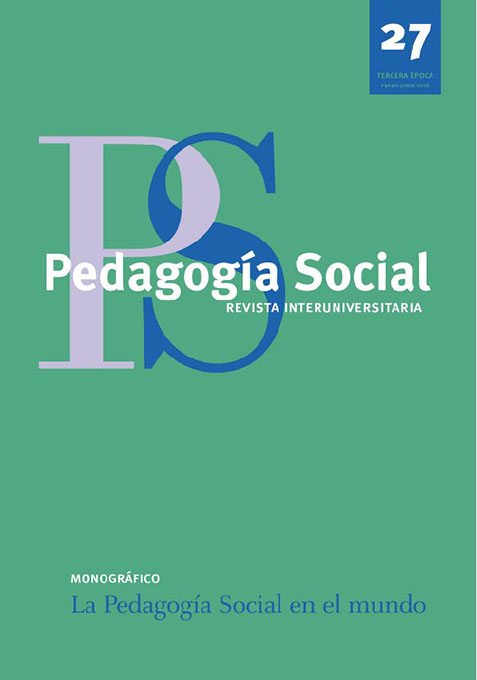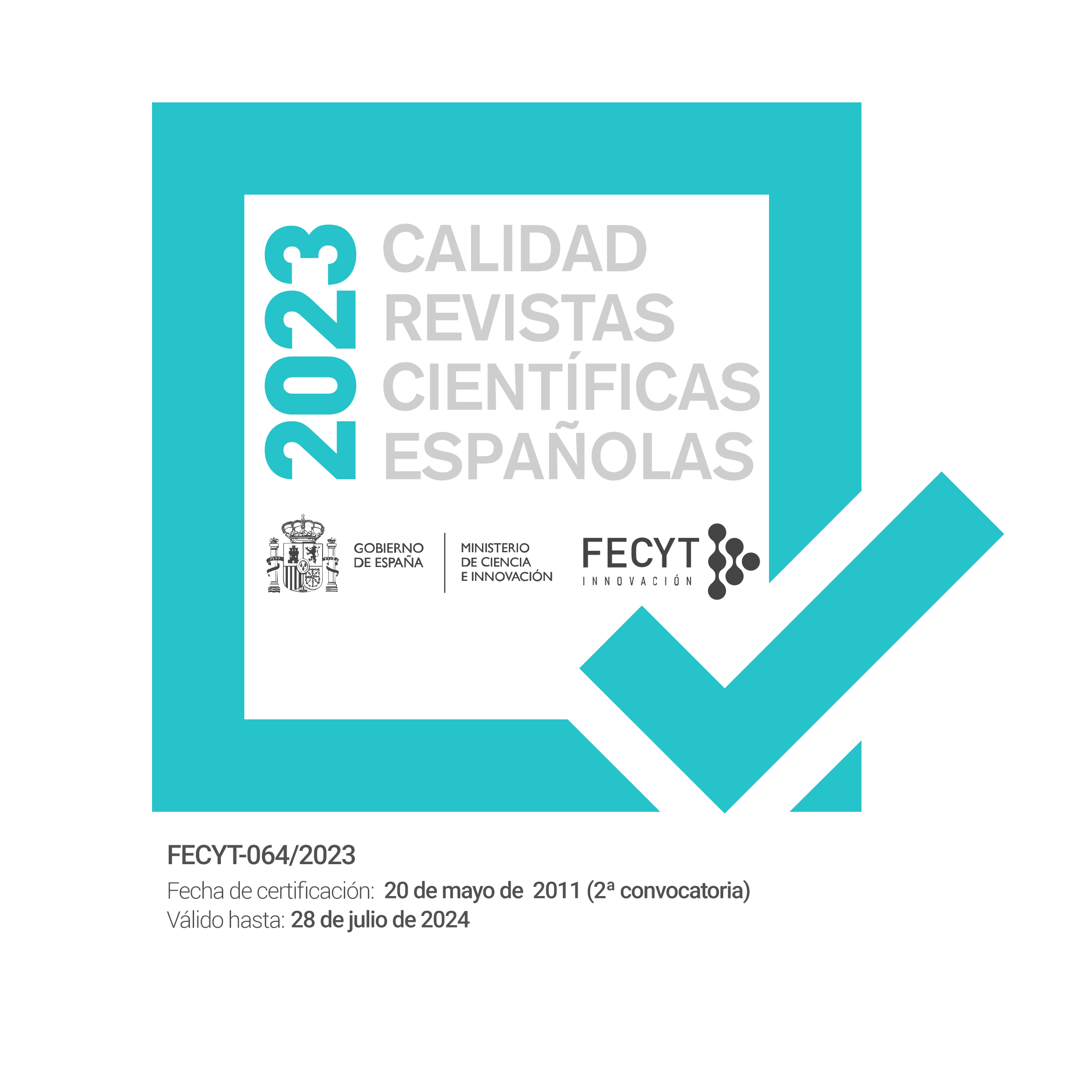Pedagogía Social en Sudáfrica: Manteniendo la tensión entre academia y activismo
DOI:
https://doi.org/10.7179/PSRI_2016.27.13Palabras clave:
Educación popular y de adultos, activismo, académicos, justicia social, transformación social.Resumen
La Pedagogía Social no es un término común en Sudáfrica. En su lugar, todo cuanto hace referencia a la educación que quede fuera o más allá de la escolaridad se integra en la ense- ñanza de adultos. La educación de la comunidad u otras alternativas son conocidas generalmente como educación radical o popular, y se ocupa de la transformación social, económica o política. Según la pedagogía de Paulo Freire y paradigmas de desarrollo participativo, esta pedagogía hunde sus raíces en la lucha democrática de masas contra el apartheid. Este artículo se basa en una ex- tensa investigación realizada por los autores como observadores participantes y activistas, llevada a cabo durante varios años en la educación de adultos con base universitaria por una parte, y en la praxis fuera del ámbito académico por la otra. Los autores han estado comprometidos con la educación obrera, y los elementos esenciales de la educación en el movimiento sindicalista anti- rracista, considerado como una de las fuerzas organizadas de resistencia política interna más im- portantes, son sugeridos como planes de estudio de la educación de adultos con base universitaria.
Desde 1994 y el cambio hacia la democracia, los departamentos de educación para adultos en las uni- versidades se han visto cada vez más mermados o directamente han desaparecido en otros departamen- tos o programas diferentes. Como en cualquier otro lugar en el norte, nosotros hemos sido testigos de una extenuante e incrementada profesionalización e institucionalización de la educación de adultos indepen- dientemente del contexto -y, con ello, de una notable reducción en punto de vista y propósito. Sin embargo, el enfoque metodológico ha permanecido comprometido con la participación y el diálogo, y, con la dismi- nución de estudiantes localizados a nivel comunitario que aporten amplia experiencia obtenida en el te- rreno. Por ese motivo existe un continuo énfasis en otros conocimientos basados en la práctica a través de educadores invitados, y en enviar estudiantes a diseñar y realizar investigaciones y pequeñas intervencio- nes a nivel comunitario.
La educación popular fuera de la universidad presenta numerosas formas, y como un proyecto de in- vestigación de 18 meses de duración ha mostrado, aún hay muchas iniciativas cuyo objetivo son miembros de comunidades de clase trabajadora que no tienen ningún otro acceso a la educación. Gran parte de este trabajo se basa en una ‘pedagogía de la contingencia’ que responde directamente a las necesidades y pro- blemas locales. Sin embargo, no todas las prácticas de educación popular continúan la tradición de una edu- cación radical y de concienciación. Describimos tres tensiones o contradicciones experimentadas por educadores preocupados por la transformación; en primer lugar, la tensión entre la participación como prin- cipio o como técnica; en segundo lugar, la tensión entre el cambio individual o colectivo; en tercer lugar, la tensión entre trabajar de arriba abajo o en sentido contrario a la hora de diseñar planes de estudio y pre- guntarnos ‘¿Quién lidera, y quién sigue?’ en un intento de trabajar democráticamente. Concluimos que las limitaciones y las exigencias de los políticos neoliberales han hecho el trabajo de los académicos activistas y de los activistas académicos cada vez más difícil. El artículo concluye sugiriendo que construir la solidari- dad mundial entre educadores de adultos que han transmitido sus luchas desde el pasado hasta el futuro,y educadores más jóvenes que crean nuevas formas de pedagogía radical, es una manera importante de mantener vivas las agendas y prácticas de la justicia social.
Descargas
Citas
Aitchison, J. (2003). Struggle and compromise: a history of South African adult education from 1960 to 2001. Journal of Education. 29, 125-178.
Baskin, J. (1991). Striking Back: A History of Cosatu. Johannesburg: Ravan Press.
Barr, J. (1999). Liberating knowledge: Research, feminism and adult education. Leicester: NIACE.
Bird, A. (1980). Black adult night school movements on the Witwatersrand, 1920 - 1980, Africa Perspective,17, 63-88.
Bofelo, M., Shah, A., Moodley, K., Cooper, L. & Jones, B. (2013). ‘Recognition of prior learning as “radical ped- agogy”: A case study of the Workers’ College in South Africa’. McGill Journal of Education, 48:3, 511-530.
Chambers, R (1983). Rural development: Putting the Last First. Harlow: Longman.
Chang, H., & Grabel, I. (2004). Reclaiming development. An alternative economic policy manual. London: Zed Books.
Cooke, B., & Kothari, U. (2001). Participation – The new Tyranny? London: Zed Books.
Cooper, L., Andrews, S., Grossman, J. & Vally, S. (2002a). “Schools of Labour” and “Labour’s Schools”: Worker Education Under Apartheid, In P. Kallaway (ed): The History of Education Under Apartheid: 1948-1994, New York: Peter Lang. 111 – 133.
Cooper, L. (2002b). Union Education in the New South African Democracy, in B. Spencer (Ed.): Unions and Learning in a Global Economy. Toronto: Thompson Educational Publishing. 37 – 49.
Cooper, L. (2005). Towards a theory of pedagogy, learning and knowledge in an ‘everyday’ context: a case study of a South African trade union. PhD. Thesis. Cape Town: School of Education, University of Cape Town.
Choudry, A. (2012.) Building Counter-power from the Ground up: Contesting NGOisation through Social Movement Learning and Knowledge Production. In Budd L. Hall, D.E.Clover, J. Crowther & E. Scandrett (eds). Learning and Education for a better World: The Role of Social Movements. Rotterdam, Boston, Taipei: Sense Publishers.141-155.
Choudry, A. (2014). From struggle knowledge and movement learning to the university classroom. Postcolo- nial Directions in Education, 3(2), 252-291.
Fanon, F. (2004). The wretched of the earth. Translated by Philcox, R. New York: Grove Press.
Foley, G. (Ed.) (1999). Learning in Social Action: A Contribution to Understanding Informal Education. London:
Zed Books.
Freire, P. (1973). Cultural Action for Freedom. Harmondsworth: Penguin.
Freire, P. (1983). Pedagogy of the Oppressed. New York: Continuum.
Gramsci, A. (1971). Selections from the Prison Notebook, edited and translated by Q. Hoare, & G. Nowell-Smith. London and New York: Lawrence & Wishart, International Publications.
Grossman, J. (2005). Workers, their Knowledge, and the University. In J. Crowther, V. Galloway & I. Martin (Eds.) Popular Education: Engaging the Academy. International Perspectives. England and Wales: NIACE. 77- 87.
Hooks, B. (1994). Teaching to transgress – education as the practice of freedom. New York: Routledge.
Ismail, S. (2012). Holding onto transformative practices in a university: musings of a feminist popular educator. In L. Manicom & S. Walters, S. (Eds.) Feminist Popular Education in Transnational Debates: Building ped- agogies of Possibility. New York: Palgrave Macmillan. 177-191.
Ismail, S. (2015). The Victoria Mxenge Housing Project: women building communities through social activism and informal learning. Cape Town: University of Cape Town Press.
Johnson, R. (1988). ‘Really useful knowledge 1770 - 1850:Memories for education in the 1980s’, In Lovett, T. (Ed.), Radical Approaches to Adult Education. London: Routledge.
Lorenz, W. (1994) Social Work in a Changing Europe. London: Routledge.
Magendzo, S., & Vaccaro, L. (1990). Popular Education in Chile. Harvard Educational Review, 60(1), 48-78.
Manicom, L., & Walters, S. (2012). Feminist Popular Education in Transnational debates. Building Pedagogies of Possibility. New York: Palgrave, Macmillan.
Mezirow, J. (1991). Transformative Dimensions of Adult Learning. San Francisco: Jossey-Bass Inc.
Marshal, C., & Anderson, A.,I. (2009). Activist educators-breaking past limits. New York: Routledge.
Martin, I. (1999). Introductory Essay: Popular Education and Social Movements in Scotland Today. In J. Crowther,I.
Martin and M. Shaw (Eds.) 1999. Popular Education and Social Movements in Scotland Today. Leicester: NIACE: 1-23.
Mayo, P. (1999). Gramsci, Freire and Adult Education. Possibilities for transformative action. London: Zed Books.
Nekhwevha, F. (2002). ‘The influence of Paulo Freire’s “Pedagogy of Knowing” on the South African Educa- tion Struggle in the 1970s and 1980s. In Kallaway, P. (ed.) 2002. The History of Education under Apartheid 1948-1994. South Africa: Pearson Education.
Newman, M. (2013) Credit where credit is due on non-credit adult education. Concept, 4,2, Summer 2013
Ngugiwa, T. (2013). In the name of the mother-reflections on writers and empire. Suffolk: James
Currey. Rodney, W. (1981). How Europe underdeveloped Africa. Washington DC: Howard University Press.
Smith, M. K. (2009). ‘Social pedagogy’ in the encyclopaedia of informal education, Retrieved from http://in- fed.org/mobi/social-pedagogy-the-development-of-theory-and-practice/. (10.5.2015)
Sitas, A. (1986). Culture and Production: The Contradictions of Working Class Theatre in South Africa, Africa Perspective. 1 & 2:84– 100.
Taylor, V. (1997). Social Mobilisation: Lessons from the Mass Democratic Movement, SADEP, Bellville: Uni- versity of Western Cape and South African Policy Research Unit.
Thompson, J. (1997). Words in Edgeways. Radical Learning for Social Change. Leicester:
NIACE. Thompson, J. (2000). Women, class and education. London: Routledge.
von Kotze, A.(1984). Workshop plays as worker education, South African Labour Bulletin, 9 (8): 92 – 111.
von Kotze, A. (2005) People’s education and the academy: an experience from South Africa. Engaging the acad- emy. In J. Crowther, I. Martin, I. & M. Shaw (eds.). Popular Education; engaging the academy. Leicester, NIACE. 11-21.
von Kotze, A. (2012). Composting the imagination in popular education. In B. Hall, D. Clover, J. Crowther & E, Scandrett. (Eds.). Learning and Education for a better World: the role of social movements, Rotterdam, Boston, Taipei: Sense Publishers. 101-113.
von Kotze, A. (2013). A pedagogy of contingency for precarious work. In K. Lange (Ed.) Technical and Vocational Skills development in the Informal sector. International Perspectives in Adult Education IPE 68, 87-99.
von Kotze, A., Walters, S., & Luckett,T. (2015). Navigating our way; a compass for popular educators in South Africa. (forthcoming)
Walters, S., & Manicom, L. (eds.) (1996). Gender in Popular Education, Methods for Empowerment. London: Zed Books.
Wainwight, H. (2002/3). Notes towards a new politics –new strategies for people’s power. Amsterdam: Transna- tional Institute.
Youngman, F. (2000). The Political Economy of Adult Education and Development. London: Zed Books.
Descargas
Publicado
Número
Sección
Licencia
Derechos de autor 2015 Pedagogía social. Revista interuniversitaria

Esta obra está bajo una licencia Creative Commons Reconocimiento-NoComercial 3.0 Unported.
Derechos de reproducción y archivo
La versión publicada de los artículos podrá ser autoarchivada por sus autores en repositorios institucionales y temáticos de acceso abierto. No obstante la reutilización total o parcial de los mismos en nuevos trabajos o publicaciones deberá ser autorizada por Pedagogía Social. Revista Interuniversitaria.
Los trabajos publicados deberán ser citados incluyendo el título de la Revista, Pedagogía Social. Revista Interuniversitaria, nº, páginas y año de publicación.
Responsabilidades éticas
Pedagogía Social. Revista Interuniversitaria no acepta material publicado anteriormente en otros documentos. Los/as autores/as son responsables de obtener los permisos oportunos para reproducir parcialmente material de otras publicaciones y citar correctamente su procedencia. Estos permisos deben solicitarse tanto al autor/a como a la editorial que ha publicado dicho material.
Es obligación de Pedagogía Social. Revista Interuniversitaria detectar y denunciar prácticas fraudulentas.
En la lista de autores/as firmantes deben figurar únicamente aquellas personas que han contribuido intelectualmente al desarrollo del trabajo.
La revista espera que los/as autores/as declaren cualquier asociación comercial que pueda suponer un conflicto de intereses en conexión con el artículo remitido.
Los autores deben mencionar en el manuscrito, preferentemente en el apartado del método, que los procedimientos utilizados en los muestreos y controles han sido realizados tras la obtención de consentimiento informado.
La revista no utilizará ninguno de los trabajos recibidos con otro fin que no sea el de los objetivos descritos en estas normas.
Aviso de derechos de autor/a
© Pedagogía Social. Revista Interuniversitaria. Los originales publicados en las ediciones impresa y electrónica de esta Revista son propiedad del Pedagogía Social. Revista Interuniversitaria, siendo necesario citar la procedencia en cualquier reproducción parcial o total.
Salvo indicación contraria, todos los contenidos de la edición electrónica se distribuyen bajo una licencia de uso y distribución “Creative Commons Reconocimiento-No Comercial 3.0 España” (CC-by-nc). Puede consultar desde aquí la versión informativa y el texto legal de la licencia. Esta circunstancia ha de hacerse constar expresamente de esta forma cuando sea necesario.




